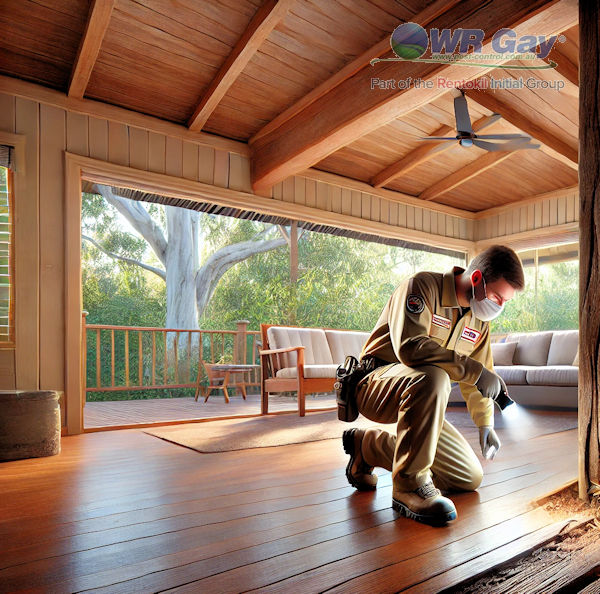Termites are a silent threat to Melbourne homes. They consume timber structures from the inside out, often without visible signs. A regular termite inspection is essential to catch these destructive pests early. Without them, infestations can grow unchecked, leading to costly damage that compromises your home’s safety.
For an experienced and qualified termite expert to perform an inspection for you, please call WR Gay Pest Control on 1300 761 979 today.
Why a Termite Inspection Is Crucial: The Extent of Damage Termites Cause
These pests can cause severe structural damage to homes. They target timber but may also attack furniture, flooring, and even walls. Over time, this can lead to weakened foundations, sagging floors, and unsafe living conditions. The damage may require extensive repairs, which can be a financial burden for homeowners.
Insurance Often Excludes Termite Damage
Most insurance policies do not cover termite damage. Insurers typically classify termite infestations as preventable with proper maintenance. This leaves homeowners fully responsible for repair costs. Regular inspections are an affordable way to protect your property and avoid unexpected expenses.
Signs That Indicate Termite Activity
Homeowners may not always recognise termite activity. Common indicators include:
- Hollow-sounding timber when tapped.
- Discarded wings near windows or doors.
- Mud tubes along walls or foundations.
- Cracked or bubbling paint on walls.
If you notice these signs, a professional inspection is needed immediately.
 The Process of a Professional Termite Inspection
The Process of a Professional Termite Inspection
Expert inspectors use advanced tools to locate termite activity. Thermal imaging and moisture meters help detect hidden colonies. Inspectors thoroughly check all areas of your home, including foundations, walls, roof voids, and outdoor timber. Detailed reports outline the findings and recommend appropriate treatments.
Why DIY Termite Detection Falls Short
DIY termite detection methods often miss early signs of infestation. Termites are experts at hiding in inaccessible areas. A professional inspection provides peace of mind and ensures all risks are addressed. Without expert help, infestations may worsen before they’re discovered.
How Often Should You Schedule an Inspection?
Regular inspections are key to protecting your home. Annual checks are recommended fYes, annual inspections are essential for ongoing protection. Termites are active year-round in Melbourne’s climate. Regular checks ensure that any signs of activity are caught before they escalate into major problems.or most properties. Homes in high-risk areas or with past infestations may require more frequent assessments. Consistent inspections help catch termites early and prevent significant damage.
Benefits of Early Detection
Identifying termites early limits the extent of damage they cause. Treatments can be applied quickly, reducing costs and stress. Early detection also preserves the value of your property. A proactive approach ensures your home remains a safe and comfortable place for your family.
FAQs About Termite Inspections in Melbourne
A termite inspection typically takes 1 to 2 hours. The duration depends on the size of your property and the extent of the infestation. Inspectors will thoroughly examine all accessible areas to ensure nothing is missed. No, termite inspections are non-invasive. Inspectors use specialised tools to detect termites without causing damage to your home. They examine both visible and hidden areas to provide an accurate assessment. If termites are detected, inspectors will provide a detailed report. The report includes recommendations for treatment and prevention. Immediate action can then be taken to eliminate the infestation and protect your home. The cost of a termite inspection depends on your property’s size and condition. On average, prices start from around $200. This is a small investment compared to the potential cost of repairing termite damage. While inspections themselves don’t prevent infestations, they are a key step in prevention. Early detection allows for timely treatments, which can stop termites from causing further damage. Inspectors may also recommend preventative measures. Yes, annual inspections are essential for ongoing protection. Termites are active year-round in Melbourne’s climate. Regular checks ensure that any signs of activity are caught before they escalate into major problems.How long does a termite inspection take?
Are termite inspections invasive?
What happens if termites are found during an inspection?
How much does a termite inspection cost in Melbourne?
Can inspections prevent future termite infestations?
Are annual termite inspections really necessary?
Protect Your Home Today
Don’t let termites compromise your property. Regular inspections are your first line of defence against these destructive pests. Contact WR Gay Pest Control today for expert termite inspection services. With over 60 years of experience, we’re Melbourne’s trusted choice for pest control. Call 1300 761 979 now to book your inspection!
More Information About Melbourne Termites
The Life Cycle of a Termite
Termites undergo a well-structured life cycle comprising three primary stages: egg, nymph, and adult.
The cycle begins with a queen laying eggs in the nest. A termite queen can lay thousands of eggs annually. These eggs hatch into nymphs, which resemble miniature termites. Nymphs grow through several moults, developing into one of three castes: workers, soldiers, or reproductives.
Workers form the majority of the colony and handle food collection, nest maintenance, and care for other termites. Soldiers protect the colony with their strong mandibles or chemical defences, depending on the species. Reproductives include the king, queen, and winged alates. Alates leave the nest during swarming season to form new colonies.
Queens can live for decades, producing vast colonies, while workers and soldiers typically survive for one to two years.
Favourable Conditions for Termites
Termites thrive in warm, moist environments. Subterranean termites, the most common species, require contact with soil to survive. They build mud tunnels to maintain humidity and protect themselves from predators and dehydration.
Wood is their primary food source, but they prefer damp or decaying timber. Leaking pipes, poor drainage, or humid basements create ideal conditions for infestations.
Tropical and subtropical climates provide the most suitable environments for termites due to consistent warmth and high humidity. However, they can adapt to cooler regions by nesting underground or within walls.
To prevent termite activity, reduce moisture around your property, repair leaks, and store firewood away from your home. Regular inspections by professionals are essential to detect and manage potential infestations early.

